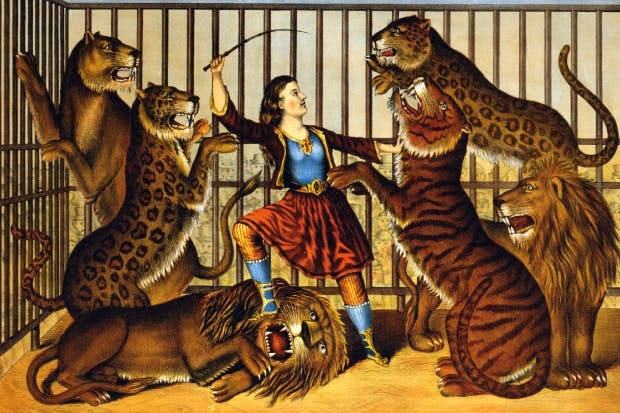Mastering Our Instincts
Taming your inner beast and training your sage is how we become better people
“For what is Man? A rational animal, subject to death. At once we ask, from what does the rational element distinguish us? From wild beasts. And from what else? From sheep and the like. Look to it then that you do nothing like a wild beast, else you destroy the Man in you and fail to fulfill his promise. See that you do not act like a sheep, or else again the Man in you perishes.”
– Epictetus
The Stoic virtues—Courage, Wisdom, Justice, and Temperance—are not abstract ideals to be admired from a distance. They form the foundation of a disciplined program, a blueprint for the rational development of our true nature. To follow Stoic philosophy is to engage in a lifelong process of self-mastery, shaped by two complementary pursuits: taming the beast and training the sage.
At its core, Stoicism is not about achieving a cold, unfeeling detachment from the world. It is not about becoming an emotionless Spock-like figure, impervious to life’s ups and downs. Instead, it is a commitment to continual self-improvement—a means of forging a life governed by reason rather than impulse. The goal is not to suppress emotions but to master them, ensuring that we do not suffer unnecessarily at the hands of fortune’s inevitable twists.
The ancient Stoics recognized that humans possess the rare capacity for rational thought, but we often fail to live by it. Instead, we default to the instincts of our animal nature—what might be called the monkey mind of emotion or the lizard mind of base survival instinct. We are capable of higher reasoning, but unless we acknowledge this capacity and actively cultivate it, we remain ruled by impulse, no better than creatures who react rather than reflect.
Taming the Beast
To cultivate our rational nature, we must first rein in the forces that seek to overpower it. Temperance and Courage serve as our tools in this battle.
Courage is the ability to face external threats and the internal fortitude to act rightly, even when fear, anxiety, or desire pushes us in the opposite direction. Fear is an emotional reflex, often irrational and rooted in false perceptions. Courage trains us to see past those distortions and move forward despite them.
Temperance, meanwhile, disciplines our appetites. The goal is not to reject emotions outright but to channel them wisely. Anger, desire, and pleasure can be powerful motivators, but they become tyrants without restraint. True self-mastery lies not in suppressing emotions but in not being controlled by them. We should use them, not be used by them.
Training the Sage
Once the emotional tempest is calmed, the work of sharpening reason can begin. Justice and Wisdom are the tools that shape our higher selves.
Justice, properly understood, is not blind adherence to laws or customs. It is a deeper recognition of balance, fairness, and the interconnected nature of human life. It is seeing beyond self-interest, beyond ideology, and beyond dogma to navigate a world that is neither fair nor predictable.
Wisdom, in turn, demands that we think before we act—not just at the level of immediate consequences, but in a manner that accounts for more profound, second-order effects. A wise person does not simply react; they reflect, anticipating outcomes and weighing them against reason. This is how we move beyond instinct and impulse to live as rational beings, engaging with the world from a position of clarity rather than confusion.
The Work Never Ends
Pursuing rational self-mastery is not a finish line to be crossed but a discipline to be practiced daily. Some days, the beast wins. Some days, the sage falters. But the difference between the average person and the Stoic is simple: we recognize the struggle and choose to continue.
For those willing to engage in the work, the reward is not an easy life but a resilient one—a life where suffering is minimized, not because the world is less chaotic but because we have learned to navigate its storms with clarity, courage, and reason.


